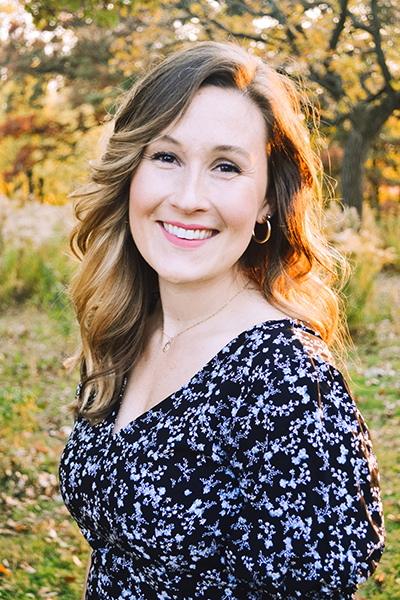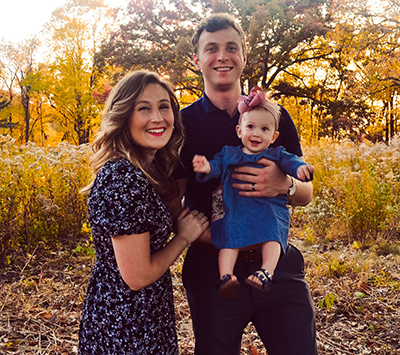Just in time for National NFP Awareness Week (July 25-31), we’re sitting down with Bridget Busacker, founder of Managing Your Fertility. Bridget has her master’s degree in health communication from the University of Minnesota and is on a mission to fuse the science of fertility awareness based methods and theology of the body into the everyday practice of natural family planning. In this interview, Bridget shares how charting your cycle can optimize your daily life, such as your workouts and work schedule.
Radiant: What is Managing Your Fertility all about, and what inspired it?

Bridget Busacker: Managing infertility is an online one-stop shop for fertility awareness with resources for women and couples. It was developed out of my own frustration during the engagement process. When [my husband and I] signed up for NFP classes, it ended up being a multi-night event of trying to figure out what method we should pick. I couldn’t find just one online website where I could go to compare and contrast methods and know that they were all approved by the Catholic Church. After participating in the GIVEN Institute, a friend and I made it our action plan to put our dreams of providing a one-stop shop of comprehensive fertility awareness into a reality. Through collaboration with different doctors and medical professionals I am actually directing people to the resources that already exist instead of reinventing the wheel.
Want more Radiant? Sign up for our weekly newsletter!
Radiant: Okay, so what is NFP, and how is using a fertility awareness based method (FABM) different from just tracking your period on an app?
Bridget: NFP has really become known as the integration of both science and theology. I like to say it’s the science of fertility. As a couple learns it, they learn about the woman’s cycle, how it works, and what goes on hormonally. This can also determine infertile and fertile times. Then, with the application of theology of the body, we can come to understand the spiritual reality of our bodies and the beauty of how we’re created and what it looks like in respecting each other in marriage, and specifically in sex. It’s the ultimate virtue builder. NFP is a tool that helps us to grow in love instead of lust.
Tracking your period is a great starting point, but it’s not giving the full scope of what’s really going on hormonally with the entirety of your cycle. It may not lead to [understanding] possible issues with your overall health, while charting your entire cycle can.
Radiant: When and why should a woman start charting?

Bridget: I think for any woman, it’s helpful information to know how your body works. It’s a great way to be an advocate of your own health. To be able to understand how your own body works, you do have to do some of the work, and sometimes this can be intimidating. But remember it’s okay to ask your health provider questions, and to push back on things that do not sound morally okay to you. Women who are charting today are doing the work not just for themselves but for future generations of women. Change really does start with us. Charting really speaks to the movement of self care and taking care of ourselves holistically. The more we talk about charting with our medical providers, the more of a chance there is that they will see the benefits of it and start recommending it to others.
Radiant: One of the fascinating aspects that you talk about in regard to charting is cycle syncing. What is this all about, and how can a woman plan out appropriate workouts based on her cycle and optimize her work schedule?
Bridget: During the four different phases of a cycle, a woman is going to feel different energy surges and energy levels based on the fluctuation of her hormones. Cycle syncing helps keep you from pushing your body unnecessarily and instead teaches you to work in harmony with your body. For example, when you’re preparing for your period, it’s actually a really good time to be a little more gentle with yourself and your workouts. At this time in your cycle, doing something like yoga or going for a walk is going to feel better for your overall health and energy levels. Ovulation is when you’re feeling really good and you can do those harder workouts. You just have to pay attention to where you are in your cycle. It’s really tailoring your workout to help your body be healthy and at its optimal self.
Knowing this information can be helpful not only to optimize your workouts but also to sync your work calendar. There’s a whole website, The Aligned Cycle, which talks about recognizing energy levels based on your work so that you can maximize and figure out when you should be scheduling larger meetings, events, interviews, and then setting aside time for more downtime or focus on more personal professional development work.
Radiant: What are some of your favorite stories of women who have started charting their cycle?
Bridget: I love the stories that are shared as part of the New Feminist Friday blog at Managing Your Fertility. The blog posts feature a wide variety of women who either started charting when they were really young, started charting in college, or because they had health issues. I am thinking of Rachel Ullmann, who is now the executive director of the GIVEN Institute. She had a really amazing story of navigating issues with her cycle and her family genetics, which included the BRCA gene, which is an indicator for ovarian cancer. Several doctors recommended that she not have children or have a hysterectomy. Instead she took a different route. She watched her health closely, got regular blood work, ultrasounds, mammograms, etc., and here she is today doing amazing work, living healthy, and a wife and mother to three children.
Radiant: What would you say to the woman who feels isolated using NFP and whose cycle isn’t the status quo?
Bridget: Community is so important. If you’re married, I think it’s really helpful to have another couple that you feel that you can open up about sex and NFP to and create those boundaries together. This provides a safe space to share struggles, pray for each other and pray with each other. Online resources are great, but sharing in person takes it to a level that can’t be reached in a Facebook group, website or reading blog posts. The same is true if you are single. In college I reached out to a couple of friends to ask if they’d want to start learning to chart together. It really allowed us to speak more openly and created space to give each other support when someone realized that things didn’t look normal in their cycle and they were going to get help. It was like, “Hey, I’m actually realizing things aren’t looking normal with my cycle.” That community can start by just reaching out.
If you’d like to learn more about your fertility and overall health, you can visit Bridget’s website, Managing Your Fertility, listen to her podcast, and even find this beautiful prayer she wrote to Our Lady, Intercessor of Fertility Awareness.




